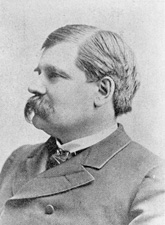Dwight M. Sabin
| Dwight May Sabin | |
|---|---|
 |
|
|
United States Senator from Minnesota |
|
|
In office March 4, 1883 – March 4, 1889 |
|
| Preceded by | William Windom |
| Succeeded by | William D. Washburn |
| 9th Chairman of the Republican National Committee | |
|
In office 1883–1884 |
|
| Preceded by | Marshall Jewell |
| Succeeded by | B. F. Jones |
| Member of the Minnesota House of Representatives | |
|
In office 1878 1881 |
|
| Member of the Minnesota Senate | |
|
In office 1872-1875 |
|
| Personal details | |
| Born |
April 25, 1843 Marseilles, Illinois |
| Died | December 22, 1902 (aged 59) Chicago, Illinois |
| Political party | Republican |
| Military service | |
| Service/branch | Union Army |
| Battles/wars | American Civil War |
Dwight May Sabin (April 25, 1843 – December 22, 1902) was an American politician who served as U.S. Senator from Minnesota and in the Minnesota Legislature.
Sabin was born in 1843 in Marseilles, Illinois to Horace Carver Sabin and Maria Elizabeth Webster. In 1857 his family moved back to his grandfather's farm in Windham, Connecticut after both of his parents had become ill and unable to manage their own farm. He briefly attended Phillips Academy studying civil engineering and mathematics but left school during the American Civil War. He acted as a quartermaster's clerk with the United States Treasury and as an aide attached to a cavalry brigade. After his father died in 1864 he was discharged and returned to Connecticut to manage his family's farm.
In 1867 his doctor suggested Sabin relocate for the sake of his health. He moved to Minnesota, settling in Stillwater, Minnesota and becoming involved in different lumber and manufacturing interests. In 1870 he was first elected to the Minnesota Senate. Over the next 12 years he won election to both the Minnesota Senate and Minnesota House of Representatives a total of six times. In 1883 he was elected to the United States Senate from Minnesota. He served from March 4, 1883, to March 4, 1889 in the 48th, 49th, and 50th congresses and was involved in legislation regarding railroads, veterans pensions and the development of the Soo Locks (where one lock is named in his honor). He also served as the chair of the Republican National Committee from 1883 to 1884.
...
Wikipedia
